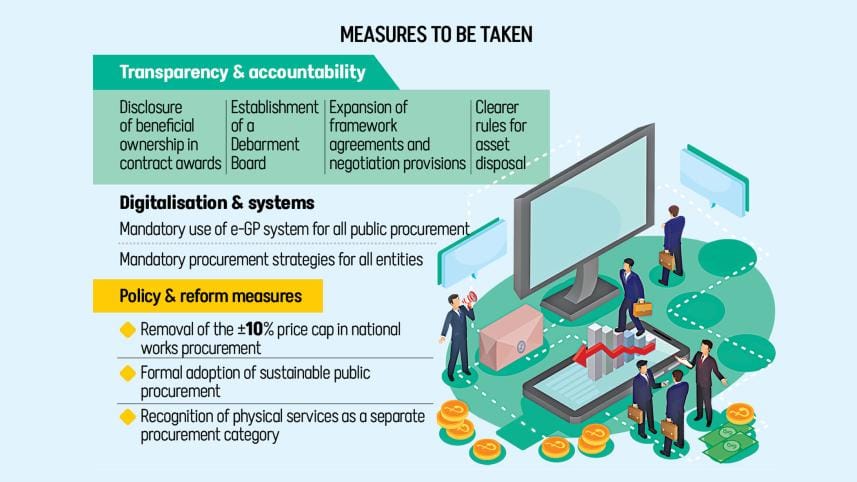With new law, all govt purchases must move online now

The government has shifted all public procurement online in a bid to curb corruption and bring greater transparency to spending, ending the decades-old practice of submitting physical tenders.
From now on, all purchases of goods, services and works, worth roughly around $30 billion a year, will be conducted through the Electronic Government Procurement (e-GP) system, according to a new ordinance issued this week.
The Public Procurement Rules 2025 also abolished the long-debated price cap, which previously allowed bids up to 10 percent higher or lower than the estimated cost. There were criticisms that the provision opened the door to manipulation.
The e-GP system for public purchase was introduced in 2011. However, around 35 percent of the government's annual procurement still took place manually, with tenders submitted on paper, according to the Bangladesh Public Procurement Authority (BPPA).
Under the new Public Procurement Rules (PPR), there is no provision to allow manual or direct procurement, even for small-scale purchases.
SM Moin Uddin, chief executive of the Public Procurement Authority, described the reform as a milestone.
"The Public Procurement Rules-2025 is more than just a revision; it is a comprehensive reform that embeds sustainability, digitalisation, and international best practices into the procurement process," he said.
The new law introduces clearer definitions of procurement roles, streamlined procedures and stronger accountability measures to tackle irregularities and end syndication.
It sets detailed rules on contract pricing, defect liability and sustainability benchmarks, while requiring disclosure of beneficial ownership in contract awards.
For the first time, physical services, such as security or maintenance work, are recognised as a distinct procurement category. Other major reforms include wider use of framework agreements, creation of a debarment board to blacklist offenders, and stricter guidelines for the disposal of state assets.
Officials say the rules also introduce sustainable public procurement, which incorporates environmental and social responsibility into public spending decisions. Procuring agencies now will have to prepare strategy documents before initiating purchases.
Md Kamal Uddin, secretary of the Implementation Monitoring and Evaluation Division (IMED), welcomed the changes. "This is a great step forward in ensuring competition and fairness in the public procurement process," he said.
Economists and governance experts have also praised the new procurement law.
Selim Raihan, executive director of the South Asian Network on Economic Modeling (Sanem), called the abolition of the price cap and the mandatory e-GP system "a decisive shift away from outdated practices that had allowed space for manipulation and political influence".
He advocated for independent monitoring, performance audits and stronger capacity-building in ministries to ensure consistent enforcement.
M Masrur Reaz, chairman of Policy Exchange Bangladesh, said the new rules indicate "a shift away from favouritism, political influence, and inefficiency in procurement".
He described the inclusion of beneficial ownership disclosure and sustainability principles as a significant step, but said ministries will need greater technical and administrative capacity to put the reforms into practice.
Iftekharuzzaman, executive director of Transparency International Bangladesh (TIB), said that reforms must be applied equally across the board.
"Equality is more important because within the process itself, there are segments that enable formalistic control and obstruct the spirit of open competition," he said.
He said loopholes could still be exploited if internal controls are poorly designed or selectively applied.
The withdrawal of certain provisions may help close avenues for manipulation, creating space for healthier competition. "That is what we should aspire to," added the TIB executive director.



 For all latest news, follow The Daily Star's Google News channel.
For all latest news, follow The Daily Star's Google News channel.
Comments